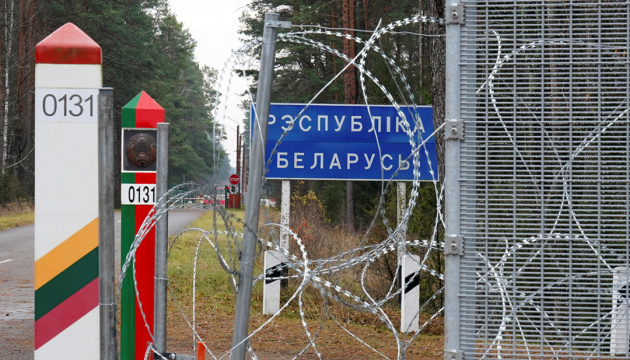Listen to the article
Belarus Escalates Border Pressure on Baltic States as Lithuania Faces Migration Surge
Lithuanian authorities have reported a significant spike in illegal border crossings from Belarus, marking what officials describe as an intensified campaign to destabilize the Baltic region. October saw 275 attempted illegal crossings—the highest monthly total in six months—with nearly half occurring during the final five days of the month alone, according to Ukraine’s Center for Countering Disinformation.
The dramatic increase coincided with Lithuania’s decision to close several border checkpoints after detecting mass drone launches from Belarusian territory. These drones, primarily used for cigarette smuggling operations, represent part of what Lithuanian officials characterize as a coordinated hybrid attack combining economic pressure, information warfare, and manufactured migration flows.
“What we’re witnessing is a deliberate escalation,” said a Lithuanian border security official who requested anonymity. “The timing of this surge immediately following our border checkpoint closures demonstrates the responsive and tactical nature of these operations.”
The pressure on Lithuania’s eastern border reflects a broader pattern of tension in the region. Over the past ten months, Lithuanian border guards have intercepted more than 41,000 attempted illegal entries—a 20% increase compared to the same period last year. Security analysts view these numbers as evidence that Belarus is systematically weaponizing migration to exert pressure on European Union member states.
This strategy echoes similar tactics employed by Belarusian authorities in 2021, when the Lukashenko regime orchestrated the movement of thousands of migrants from the Middle East to Belarus’s borders with Poland, Lithuania, and Latvia. That manufactured crisis created humanitarian concerns and political tensions that reverberated throughout the EU.
Regional security experts note that Belarus’s actions align with Russian strategic interests in the Baltic region. “Minsk and Moscow are coordinating a multi-layered hybrid campaign against Europe,” said Dr. Elena Korosteleva, professor of international politics at the University of Kent. “Migration pressure serves as just one component of a broader strategy designed to strain resources, test NATO cohesion, and distract from other fronts.”
The Baltic states—Lithuania, Latvia, and Estonia—occupy a strategically sensitive position as NATO’s eastern flank and have been vocal supporters of Ukraine since Russia’s full-scale invasion began in February 2022. This support has made them targets for various forms of hybrid pressure from both Russia and its close ally Belarus.
Lithuania’s Interior Ministry has reinforced border security in response to the escalating situation, deploying additional personnel and surveillance equipment. The European Border and Coast Guard Agency (Frontex) has also increased its presence in the region.
“This is not simply about illegal migration,” said Agnė Bilotaitė, Lithuania’s Minister of the Interior, in a recent press briefing. “These actions represent a coordinated attempt to test our resilience and response capabilities.”
The EU has condemned Belarus’s actions, with European Commission officials reiterating support for Lithuania and calling for additional sanctions against the Lukashenko regime. However, addressing the root causes of the manufactured migration crisis remains challenging given Belarus’s isolation from Western diplomatic channels.
For residents of Lithuania’s border regions, the increased pressure brings practical concerns about security and stability. Local governments report strained resources and heightened anxiety among border communities.
As winter approaches, there are additional humanitarian concerns about migrants potentially stranded in harsh conditions between borders. International organizations have called for ensuring humanitarian protections while maintaining border security.
The situation underscores the evolving nature of security threats facing the EU’s eastern members, where traditional military concerns increasingly overlap with hybrid tactics designed to exploit vulnerabilities without triggering direct NATO involvement.
Fact Checker
Verify the accuracy of this article using The Disinformation Commission analysis and real-time sources.




12 Comments
Hybrid warfare tactics like this are becoming increasingly common. It’s crucial that the affected countries work together to counter these threats and maintain stability in the region.
I hope the international community closely monitors this situation and provides any necessary support to the Baltic states as they navigate these challenges.
This is a complex geopolitical situation with no easy solutions. The Baltic states will need to remain vigilant and work closely with their allies to counter these hybrid threats from Belarus.
Maintaining border security and managing migration flows will be crucial for Lithuania as it navigates this challenge. I hope they are able to find effective ways to respond.
This is a troubling situation that highlights the ongoing geopolitical tensions in the region. Belarus’ actions seem designed to create instability and disrupt the Baltic states.
I hope the affected countries are able to work together effectively to counter these hybrid threats and maintain security and stability in the region.
Belarus seems intent on causing disruption and unrest in the Baltics. The dramatic spike in illegal border crossings is concerning and suggests a deliberate, coordinated effort to pressure Lithuania.
I wonder what the long-term goals are behind Belarus’ actions. Destabilizing its neighbors could have serious regional implications that need to be addressed.
The use of drones for smuggling operations and as part of a broader campaign to destabilize the region is a concerning development. Belarus appears to be escalating its efforts to pressure the Baltic states.
It will be important for the international community to closely monitor this situation and provide any necessary support to Lithuania and its neighbors as they work to address these threats.
This is a concerning situation. Belarus appears to be using migration flows and hybrid tactics to try and destabilize its neighbors. It’s worrying to see this kind of coordinated effort to apply pressure on the Baltic states.
The use of drones for cigarette smuggling and as part of a broader hybrid campaign is quite alarming. Lithuania is right to be vigilant in responding to this threat.